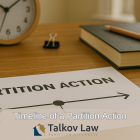When family members disagree on whether to sell, divide, or retain shared real estate, legal disputes can quickly escalate. Whether the property was inherited, jointly purchased, or family-owned for generations, a partition action is the legal solution to fairly divide, sell, or distribute ownership interests. These cases often involve deep-rooted family dynamics, significant financial stakes, and multiple co-owners, making experienced legal representation essential.
At Talkov Law Partition Attorneys, we are California’s first and largest law firm dedicated exclusively to partition actions, with over 500 partition cases handled statewide. Our attorneys represent clients in family real estate disputes, ensuring fair resolutions for residential, commercial, and investment properties.
When Is an Intra-Family Partition Action Necessary?
Co-owning real estate with family members can lead to conflicting financial interests, emotional disputes, and legal complexities. A partition action becomes necessary when:
- Heirs inherit a property together but disagree on whether to sell or keep it
- Siblings, parents, or relatives purchased a property together, but have gone different ways in life
- Family members were gifted or transferred property but now cannot agree on its use or sale
- A property has multiple family stakeholders, making decision-making difficult
Under California Code of Civil Procedure § 872.210, any co-owner—regardless of family ties—has the right to force the sale or division of jointly owned real estate unless a valid written agreement states otherwise.
Even when emotions run high, legal action may be the only solution to ensure that each family member receives their fair share of the property’s value.
How Do Intra-Family Partition Actions Work?
Partition actions for family-owned real estate are incredibly common. They follow a structured legal process to resolve disputes among co-owners. Upon an analysis of the deeds to determine the ownership interests and calculation of any unequal contributions to the property, the property would then be sold if other co-owners are not interested in a buyout.
Legal Rights of Family Co-Owners
Under California Code of Civil Procedure § 872.710, a property owned by multiple parties must be partitioned unless there is a legal agreement to prevent it. This means:
- A family member who wants to sell their share cannot be forced to remain a co-owner
- If one party refuses to sell, the court may order a sale of the entire property
- If feasible, the court may allow partition in kind, physically dividing the property, which is generally only available on vacant land or multi-property partitions
The Role of the Court and Partition Referee
If a dispute cannot be resolved privately, the court may appoint a partition referee under California Code of Civil Procedure § 873.010 to:
- Determine the best method of partition, whether by sale, buyout, or division
- Oversee the property valuation and ensure fair market pricing
- Ensure proper distribution of proceeds, accounting for each party’s financial contributions
Division of Financial Interests and Reimbursements
Before a sale or division occurs, co-owners may claim credits and reimbursements under California Code of Civil Procedure § 872.140 for:
- Mortgage payments made by one co-owner
- Property taxes, maintenance, and repairs paid unequally
- Rental income received by certain co-owners while others were excluded
A skilled partition attorney will ensure that all such unequal payments are properly reimbursed in the partition action.
Common Challenges in Family-Owned Partition Actions
Most intra-family partition actions proceed promptly through the courts. However, family partition actions sometimes present unique legal and financial hurdles, including:
- Emotional conflicts that escalate legal battles
- Unequal financial contributions toward mortgage, taxes, or upkeep
- Disagreements over sentimental value when one family member wants to keep the home while others prefer to sell
- Inherited debts or liens that must be addressed before sale or division
At Talkov Law Partition Attorneys, we specialize in navigating these complexities to ensure that our clients receive their fair share of the property’s value while minimizing unnecessary legal disputes.
Why Choose Talkov Law for Family Partition Actions?
With over 500 partition cases handled statewide, Talkov Law is California’s #1 partition law firm. We provide:
- Expert legal representation focused exclusively on partition actions
- We have eleven full-time attorneys dedicated exclusively to partition actions
- Comprehensive financial analysis to ensure equity, contributions, and reimbursements are properly accounted for
- Cost-effective legal services with flexible fee structures
- Statewide representation for family real estate disputes throughout California
If you are involved in a family real estate dispute, don’t let emotions or financial disagreements delay your right to a fair resolution.
Call (844) 4-TALKOV or contact us online today for a free consultation.
What If My Family Member Has Been Living in the Property Rent-Free—Can I Get Reimbursed?
Possibly. If one co-owner has been exclusively occupying the property while others have been excluded, they may owe “occupancy rent” under California law. The court can assess whether the occupying co-owner should compensate the others for lost rental value.
Do I Need My Family Member’s Signature to Sell the Property?
No. If they refuse to cooperate, a judge in a partition action can authorize the sale without their signature. The court will ensure that the property is sold at fair market value and that the proceeds are distributed according to each owner’s legal interest.
What If My Family Member Refuses to Communicate About Selling the Property?
Lack of communication does not prevent a partition action. If your co-owner is unresponsive, you can file a partition lawsuit, and the court will proceed with the case regardless of their cooperation.
Can I File a Partition Action if My Co-Owner Has Passed Away?
Yes. If a co-owner has died, their interest typically passes to their heirs or estate. A partition action can still be filed against their estate or new titleholders if the property remains jointly owned.
Can a Partition Action Force the Sale of a Property if My Co-Owner Claims It Was “Gifted” to Them?
If the property is held in both names, a co-owner cannot unilaterally claim full ownership without legal proof. The court will review title documents, financial contributions, and any written agreements to determine whether a partition action is valid.




































































































































